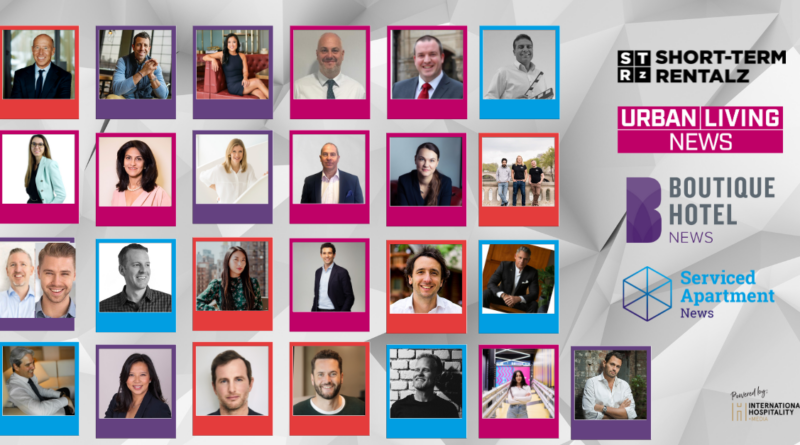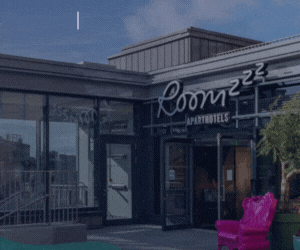Worldwide: Drawing from the coverage provided by four sector-leading b2b websites, the editorial team at International Hospitality Media [IHM] highlight 25 influential leaders across travel, hospitality and real estate who they believe are ones to watch over the next 12 months.
This year, the editorial team [George Sell, Eloise Hanson and Paul Stevens] has divided the respective leaders into five separate categories in order to best showcase their expertise. The categories include: Brands; Development; Entrepreneurs, Finance; and Tech.
1. Brands
In a global segment predicted to be worth $4.5 billion by 2027, HomeExchange is primed to become the leading home swapping platform worldwide, and at the heart of its success is its CEO, Harvard Kennedy School graduate Emmanuel Arnaud.
After merging with Arnaud’s initial business GuestToGuest in 2018, HomeExchange has already acquired two competitors this year – Love Home Swap [UK] and My weekend for you [France] – marking its first purchases since 2019 and strengthening its presence in markets such as the UK, the United States and Australia.
Under Arnaud’s stewardship, HomeExchange’s rise to prominence has been meteoric over the last four years, with exchange nights booked in 2022 32 per cent up on 2019 levels [3.7 million exchange nights]. Additionally, the Tukazza Group-owned business has seen its membership soar to 108,000+ members, propelled by a desire to foster deeper connections between the platform’s hosts and guests.
Arnaud will speak at the inaugural STRz Summit in London on Wednesday 18 October, when discussing ‘All of the fun, none of the hassle – next-generation membership clubs’.
If you’re going to appoint a COO for a high-end and rapidly growing hospitality portfolio, you would probably go for someone with a strong track record of success and innovation at sector-leading brands.
And that is precisely what AKA has done with the recent appointment of T. Blake Danner. His CV is littered with names associated with cutting edge cool such as NoMad, Freehand, The Line, Morgans and Ian Schrager Hotels.
At AKA, part of the Korman family group of companies, Danner will ensure that the service for which the brand is known will not be compromised by its rapid growth.
This growth is a result of AKA’s partnership with Electra America, which formed Electra Hospitality Group [EAHG] in 2021. Since the $750 million opportunistic hotel fund launched, AKA has added seven new properties with a current total of 16 assets across the US and the UK.
There will be plenty more in the coming years for Danner to get his teeth into, across both hotel and serviced apartment verticals.
When the editorial team at IHM formulated this list, Guy Hutchinson was president and CEO of Abu Dhabi-based hotel group Rotana. He was selected because the company had made the announcement that it was going to open two properties in London, under its Centro economy segment brand. This was quite a departure for the group which manages a portfolio of more than 100 properties throughout the Middle East, Africa and Turkey.
The day before we went to press, it was announced that Hutchinson will be leaving Rotana to take up a new role at Hilton.
Development of the first London property is already underway and Hutchinson is not leaving his role until 2024, so he will still be overseeing the venture. He’ll be missed at Rotana, where, during a tenure of almost a decade, he has been instrumental in steering the company’s growth.
Details of the Hilton role have yet to be released, and we will watch with interest to see the next chapter of Hutchinson’s career unfold.
In March this year, we reported that French development and construction giant Bouygues Immobilier had formed a JV with US investment manager Ares to launch the Nomo coliving brand.
The platform will develop, acquire and operate managed buildings aimed at 25 to 40 year olds. Nomo will open its first site in Bordeaux at the end of 2023 and has a target of 10,000 beds across France by 2030.
In charge of steering the ship is managing director Augustin Rousseau. With a development and investment background, he has an understanding of the needs of both JV partners, and is excited by the potential for growth in the coliving sector, which has has described as bringing “a breath of fresh air to the way managed real estate should be designed and developed”.
A pipeline of more than 1,500 beds has already been secured for the platform, which is the second major coliving play for Ares, which has also committed up to €1 billion to fund the European expansion of French coliving brand Colonies.
Fashion publication ELLE made its foray into the hotel sector last year with the opening of Maison ELLE in Paris. It marked the first time a major magazine title launched a brick-and-mortar hotel concept, and under the group’s newly-formed ELLE Hospitality division, is due to open a second property in Mexico.
Vu joins the international advisory board at Maison ELLE, exploring development opportunities and new partnerships for the group. It’s an exciting time for ELLE as interest in lifestyle brands and products bloom, with travellers seeking unique experiences and design alongside connectivity with local communities. ELLE’s influence in the fashion and beauty world lends itself to creating immersive hospitality concepts, especially with the rise of on-property retail. At Maison ELLE, there’s potential to enter exclusive brand partnerships for guests to try before they buy.
In addition to her consultancy work with ELLE, Vu serves as chairwoman of the board of Cityland Education and was integral to the launch of Hotel Academy Phu Quoc – a vocational education and training school in Vietnam designed in partnership with Ecole Hoteliere de Lausanne. The recruitment and retention of hospitality talent remains a concern for hoteliers with only a handful of dedicated hotel schools in operation worldwide. Vu’s network and desire to support the next generation of hoteliers will benefit the growth of the Maison ELLE brand.
2. Development
Ruby Hotels is in full swing of expansion. Within the last year or so, the ‘lean-luxury’ hotel brand has opened three hotels in Munich, Amsterdam and London, with an upcoming launch in Stuttgart, and has signed an additional five properties including the group’s debut in Scotland, Ireland and France.
Fuss was promoted to group VP development in 2020 and has clearly played a pivotal role in Ruby’s growth, having been a member of the management team since the company’s inception in 2013. Her expanded responsibilities to head up new products and landlord relations is of particular importance. Firstly, Ruby focusses on converting office and retail into hotels which requires skilled collaboration and negotiation skills to obtain the necessary permissions and approvals. Conversions also present an opportunity for developers and operators to add inventory at a lower CapEx and reduced risk than new builds.
Secondly, Ruby also operates a coworking arm and has introduced six workspaces to date. I suspect Fuss will be exploring new concepts across stand alone and mixed-use sites which opens up a wealth of new development opportunities for the group.
AMRO Partners is one of the more progressive investment and real estate companies in the UK, and it has more than £1 billion of assets under management.Its portfolio spans BTR, PBSA and, most recently, coliving – with properties in the UK and Spain.
Co-founder and group president Ami Kotecha leads AMRO’s venture capital investment activity, with a focus on technology start-ups that drive transformational change in the residential and commercial property sectors where AMRO can participate as an early-stage investor and a knowledge partner. She is the driving force behind AMRO’s commitment to ESG as a core value driver for investment decisions and corporate culture – and the innovation and technology required to deliver its Net Zero Carbon commitment.
Kotecha is a recent appointee to the board of the British Property Federation [BPF] and holds several board and advisory roles including chair of the UK PropTech Association [UKPA].
Her skillset at the intersection of tech and sustainability is one which will be increasingly relevant and in demand over the next few years.
Manjas Lidder, The Stay Company
In the extended stay sector, we have seen a growing trend for opco and propco to be under the same ownership – Brookfield’s edyn and APG’s acquisition of City ID being two notable examples.
But it’s not just the global investment powerhouses who are adopting this strategy – and Manjas Lidder is a good example of a regional player who combines investment, development and operations in his skillset.
Lidder is director of PKL Investments – a UK focused property development and investment business; The Stay Company – a serviced apartment operator with more than 100 apartments across seven locations in Nottingham and Derby; and Lidder Care, which provides residential, nursing and dementia care homes for the elderly.
With so much in-house capability, from a construction team to an operating platform which is investing in digitalisation, Lidder has an end-to-end control of the business, and is not content with resting on his laurels. Leicester is the next location in his sights, to complete the East Midlands hat-trick for the Stay Company.
Matt Townson, Casa by Moda
Casa by Moda is the SFR division of Moda Living, the Yorkshire-based BTR developer and operator.
Matt Townson, is the company’s director of development and projects, and he is at an exciting time in its growth as it secures sites across the UK. Recent acquisitions have included projects in York, Glasgow and Leeds.
As well as an emphasis on creating communities, Casa by Moda is placing ESG high on its agenda. This will include embedding Moda’s technology partner Utopi’s smart environmental sensors into the homes, which enable residents to monitor everything from room temperature to air quality and light pollution. The homes will also feature air source heat pumps as part of Casa’s commitment to sustainable development and its journey to net zero.
Townson has more than 30 years of industry experience, including 16 years at urban regeneration specialist Sigma Capital Group. At Moda, he oversees the land management teams along with the planning and delivery of Casa by Moda’s pipeline of 5,000 new rental homes worth in excess of £1 billion. He’s got the ball rolling, and it is likely to pick up speed fast.
Mariya Tsvetkova, Urban Partners
After a couple of years based in London overseeing Nordic investor NREP’s European growth in the living, office and care sectors, Mariya Tsvetkova has joined Urban Partners, a fascinating new venture set up by NREP; venture capital firm 2150; credit platform Velo Capital, and new private equity investor Luma Equity.
Between them the partners have €20 billion of assets under management, and the heavyweight group has been created to “house investment verticals across real estate, venture capital, private equity and credit to address the social, economic, and environmental challenges facing cities”. Urban Partners has called on the real estate and urban investment industry to radically change “their approach to investment and how returns are measured to recognise the complexity of urban ecosystems”.
It launched with €5 billion of what it calls “constructive capital” to invest in projects which meet its criteria. Tsvetkova’s role is to boost this war chest still further through relationships with new and existing investors. Passionate and eloquent about the ESG agenda (and a regular contributor to ULN webinars and events) with knowledge underpinned by real estate and operations experience, she is clearly a woman on a mission.
3. Entrepreneurs
Selecting one of the co-founders of Airbnb as a ‘one to watch’ may initially seem a surprising move but the potential for Gebbia’s new venture to revolutionise home-sharing revenue opportunities cements his name on our list.
After stepping back from Airbnb last July, Gebbia has thrown himself into his new Samara venture, and specifically its Backyard product, which adds small homes to people’s backyards.
Initially launching in California, Backyard sets out to improve people’s lives by holistically reimagining the home and “balancing beauty, sustainability and simplicity”. Consisting of both studio and one-bedroom units made of environmentally-considerate materials, the structures could provide a long-term solution to housing crises worldwide as accessible dwelling units [ADUs] are not bound by the same regulations as short-term rentals [they are now considered a homeowner’s right by law in California] and they run sustainably through solar energy offsetting.
Gebbia’s vision is admirable, and his continued work as chairman of Airbnb’s charitable arm, Airbnb.org, points to someone with the ambition to create flexible accommodation solutions, as he did in 2008 when launching Airbnb with Brian Chesky and Nathan Blecharczyk. ADUs may just be the next big trend to monitor.
At the cutting edge of the flex workspace revolution, Gabriela Hersham, CEO of Huckletree, is conscious that people are returning to the workplace “with higher expectations than ever before”. Huckletree gives them not just office space and amenities [which include a plant-based café, members’ bar and a dedicated wellness area], but carefully curated programming such as the Founder Circle, a group of entrepreneurs who come together in person on a regular basis to share experiences, insights, and challenges with each other.
With properties in London, Manchester and Dublin, Hersham is regularly adding new locations. Each is targeting a specific industry – Web3 and AI companies in London’s Oxford Street, and a fintech firm in Liverpool Street, for example.
With a family background in real estate – her father Gary was described last year by The Guardian as “Britain’s most successful estate agent” – Hersham is forging connections with the likes of British Land, which owns the latest City of London Huckletree hub, and helping to set the standard for what flex office space can offer.
Niko Karstikko, co-founder and CEO of Bob W [which stands for ‘best of both worlds’] is spearheading the dizzying growth of a company which aims to offer ‘exceptionally cool apartments’ for ‘the 21st-century traveller who wants it all: the consistent quality of a hotel and the authentic flair and affordability of a short-stay rental’.
It is adding new properties at a breathtaking rate, and from its base in Finland, now offers apartments in 15 cities across Europe, with a further 20 in the pipeline. Growth has been both organic and via acquisitions, and the company has raised more than €30 million in funding rounds.
Karstikko is a charismatic leader, a good talker who is passionate and savvy about tech and driving the ESG agenda. Backed by venture capitalists, family offices and entrepreneurs including ByFounders, IDC Ventures, Elevator ventures, Verve VC, NREP, Tesi, Wolt co-founder Miki Kuusi and Supercell-cofounder Ilkka Paananen, he’s showing no signs of slowing down as he plants the Bob W flag in cities across Europe.
The rise in severe weather occurrences and natural disasters due to climate change has highlighted the need for innovative solutions to lead the way in travel. German native Philipp von Lamezan has done just that with SQUAKE, presenting a solution combining sustainable travel and logistics, and we should expect to hear more from the climatetech startup in the year ahead.
The company, which raised €3.5 million in seed funding in June, offers a unique product solution to travellers that enables them to compensate for the carbon emissions associated with their stays. The platform includes a single API plug-in to power precise carbon calculations for all types of activity [e.g. air, road, sea, accommodations, warehousing] according to international standards, as well as automating carbon reduction and compensation along the purchase flow.
With SQUAKE, von Lamezan is creating a benchmark for the travel and hospitality industries to follow. The startup has already built a calculation algorithm specifically for the vacation rental industry and partnered with marketplace HomeToGo for a landmark environmental project in Africa – 14Trees – which builds 3D printed affordable housing in Malawi. 2024 could be equally as exciting.
Experiential travel is all the rage. The desire to explore remote locations, be immersed in local cultures, and engage in exclusive activities is fuelling traveller decisions. It’s even leading hoteliers to extend operations beyond four walls and introduce treehouses, shepherds huts, cabins and more.
Habitas aims to reimagine the conventional hotel experience with environmentally friendly properties located in unexpected places. The brand has a global presence in the Americas, Africa, and the Middle East with an upcoming debut in Asia.
Co-founded by Ripley in 2017, Habitas oversees each project from conception through to delivery and launch. Utilising modular construction to build each property, the brand avoids single-use plastic, leverages composting and recycling, and offsets carbon emissions through reforestation. Habitas Rise is the company’s global impact arm which supports local communities through various initiatives – all aimed at providing economic and educational opportunities to indigenous peoples, youth programs, local artisans and farmers.
Recently, the Saudi government injected USD $400 million into a ‘Habitas Fund’ to develop six additional properties across the Kingdom following the success of Habitas AlUla. The whopping investment has raised the company’s profile to new heights and, coupled with its strong ESG initiatives, will open up development opportunities for the group.
4. Finance
It’s been two years now since Lloyd’s Banking Group announced its goal to become the UK’s biggest BTR landlord. It launched Citra Living with the goal of reaching 10,000 units by 2025 and 50,000 by 2030.
The man responsible for hitting this target is managing director Andy Hutchinson, and it has been noticeable that he has put his foot on the accelerator in recent months. Since June of this year, Citra has made significant acquisitions in Essex and Nottingham, as well as securing a hefty tranche of 604 homes worth £168 million on various Barratt sites across the country.
The partnership with Barratt was one of the first moves Citra made after its formation, and it is set to form an important part of the company’s growth plans. “Our focus is on delivering rental options where they’re needed most,” says Hutchinson, and the man with the banking background will no doubt be increasing the momentum over the next 12 months.
MYS Living is a JV which marks investment giant abrdn’s first move into the PBSA sector. Abrdn has teamed up with student sector veterans David Mathewson and his co-managing director, Murdo Mcilhagger, both formerly of Straits Capitol, a subsidiary of Singapore Press Holdings.
Mathewson has already co-founded and built the eighth largest student housing company in the UK by number of beds, with a value of around £1 billion. His role included fundraising, tax structuring, asset and company acquisitions, the building of operating platform with 200 staff, asset management and development, “all started from a chat over a burger with my friend and business partner”, as he puts it.
MYS is described as the first “Values-Led” living company, and is targeting B-Corp status. The accommodation on the platform will be energy-efficient and offer community space.
“Both abrdn and MYS are focused on delivering assets with best- in-class ESG credentials that fulfil the clear and growing needs of both students and universities. The ambition is to provide investors with strong and dependable returns while creating the user-friendly, sustainable, low-carbon student housing of the future,” says Mathewson.
Barry Sternlicht, Starwood Capital
Barry Sternlicht has been one of the most influential leaders in hospitality and real estate since founding private alternative investment firm Starwood Capital over three decades ago. However, Starwood’s landlord partnership with Airbnb for its ‘Airbnb-friendly’ apartments programme gives Sternlicht a fresh opportunity to make a contribution in the sector – making short-term rental hosting accessible in the United States.
Airbnb’s newest listing service differentiates itself by offering rental buildings and properties eligible for short-term stays to attract tenants who can become hosts themselves. Starwood is the most notable landlord partner for the programme so far, enabling renters to find a place to live and sublet on Airbnb part time when staying away from home.
Sternlicht and Starwood’s involvement is a significant endorsement of the programme, aligning with Airbnb’s mission to make hosting affordable and accessible by opening up fresh ancillary revenue streams for property owners. Furthermore, it underlines the companies’ commitment to promoting sustainable and responsible tourism by enforcing limits on the number of rentable nights and abiding by local community regulations.
In a world that is embracing hybrid working and flexible living trends, all parties stand to benefit from such a partnership.
Adventurous Journeys [AJ] Capital Partners is a real estate investment manager, developer and operator. Since its inception in 2008 by founder and CEO, Weprin, the firm has invested in or currently manages approximately 100 assets including over 7,300 hotel keys. Notable hotel brands include the university-anchored Graduate Hotels portfolio, Marine & Lawn golf resorts, and the new addition of outdoor recreation brand Field & Stream Lodge Co.
Managing a diverse hotel portfolio balances investment risk whilst operationally appealing to a broad traveller demographic. For example, the launch of Field & Stream next year is in partnership with Starwood Capital, with the combined powerhouse aiming to scale the portfolio quickly and capitalise on the consumer demand for nature-oriented trips.
Next year, AJ will develop its portfolio beyond the hospitality sector too, with plans to launch two living brands. Leasing for the debut Outpost Residential community in Zephyrhills is now available, marking AJ’s foray into the BTR industry. And the lifestyle multifamily collection Memoir Residential is due to launch in Portland January 2024. With AJ’s track record in creating successful hotel brands, it’s yet another sign of the continued blurring between hospitality and residential.
Yu joined KSL in 2011, and in her current role as principal, is part of the senior team overseeing the private equity firm’s European office. KSL focuses exclusively on the travel and leisure industries, investing, lending, and partnering with boutique hospitality groups through to globally branded hospitality platforms.
Within the last couple of years, KSL has been actively pursuing opportunities within the hotel sector. Notable acquisitions include the city-centre Eden Hotels portfolio in the Netherlands, the UK-based countryside boutique brand The Pig Hotels, and most recently, the luxury Italian hotel group Sereno Hotels.
At a time when single-asset transactions represent the bulk of investment activity, KSL is bucking the trend. More importantly, Yu will be responsible for overseeing the strategic expansion of groups such as The Pig, ensuring that scalability does not impact brand integrity and identity. Regarding existing investments, KSL is reportedly preparing to sell its Village Hotels portfolio nine years after the firm bought the chain for £485 million. Should plans progress, the 33-strong collection will likely draw significant interest.
5. Tech
Hannes Boller and Sandro Abegg, BODDY
Wellbeing travel tech startup BODDY is a digital marketplace connecting hospitality businesses with health and fitness operators. Boller and Abegg established the company in Switzerland in 2019, and have since expanded their operations and services across Europe, Asia and recently, North America. As of July 2023, BODDY had secured US$2.2 million in seed funding.
Many hotels, particularly within the independent boutique market, provide limited amenities, as do serviced apartments. Partnering with external companies to offer a broader range of services would help to drive room night conversion and guest satisfaction. Health-conscious travellers value convenience, and BODDY’s pay-as-you-go, white-label service offers flexible options across gyms, studios and spas – and at 60 per cent of the retail price too. Although in its early growth stage, there is wide development potential for BODDY.
Fyma is an AI-powered data and insights tool, tracking real-time movement trends within commercial real estate portfolios. The computer vision platform monitors video and image feeds such as CCTV cameras to classify and detect mobility trends. It effectively allows owners to measure and understand accurate occupancy levels, identify areas of opportunity, and make informed decisions.
The company was co-founded in 2019 by Estonia native Burns alongside chief technology officer Taavi Tammiste. Burns is responsible for the day-to-day operations of Fyma, managing the company’s international client base as well as developing the Fyma team.
By integrating with existing cameras set up on business premises, Fyma can be deployed pretty much anywhere. The office and workspace sector in particular is in a state of flux whereby understanding how and when tenants use certain areas including footfall, accessibility and dwell time, would lead to greater optimisation of these spaces. The technology has far-reaching impacts on the urban landscape, informing development prospects, reducing a building’s carbon footprint, and generating a greater return on investment.
Since launching its Homes vertical early last year, Hopper has shown it is not afraid of ruffling a few feathers among established rivals. When Expedia Group terminated their supply relationship in July, it accused Hopper of “exploiting consumer anxiety and confusing customers”, whereas Hopper concluded that Expedia had seen it as a “significant competitive threat”.
Given its recent growth strategy, Hopper, and head of homes, Susan Ho, should certainly not be underestimated. The Canadian company was the fastest-growing app in the OTA market in 2021 and has expanded its active user base by 494 per cent, targeting predominantly millennial and Gen Z demographics through social commerce initiatives.
Now, Ho is building on her previous experience leading travel planning service Journy to pursue new ways to make the booking experience even more seamless and enhance consumer loyalty in the brand. From inventory distribution partnerships to collaborations with banks, Hopper is driving awareness for its broadening array of services and product ranges.
Ho will expand on this at October’s STRz Summit, when exploring ‘Driving attention, loyalty and retention’.
Marcus Räder, Saber Kordestanchi and Mikko Nurminen, Hostaway
As a PMS in existence since 2015, Hostaway automates and simplifies the property management process, helping managers scale and grow their businesses. Now its Finnish leadership team, co-founders Marcus Räder, Saber Kordestanchi and Mikko Nurminen, are taking the company on a similar growth trajectory, having masterminded one of the largest funding rounds for a software solution in May and lined up major partnerships / integrations with Airbnb, Google and Homes & Villas by Marriott Bonvoy.
In the space of eight years, Hostaway has expanded to such an extent that its customers now collectively manage more than 100,000 properties in 100+ countries, and the vacation rental management software solution is poised for further disruption in an addressable market estimated to stand at $2 billion.
Even before its latest capital raise, Hostaway was already reporting strong profitability and a tenfold-plus increase in revenues since 2021. Now with fresh funding, the co-founders are setting their sights on expanding their customer base in burgeoning supply markets, such as the Middle East, South America and Oceania, and participating in more thought leadership opportunities, so they can continue taking Hostaway to new heights.
Landing is a flexible apartment living membership company founded by Smith in 2019. The company aims to reshape the traditional rental experience by providing members with unrestricted lease terms ranging from one month to years, alongside the ability to experience different homes within the Landing network of 20,000 fully-furnished apartments. The majority of Landing’s consumer-facing operations, including the initial search, tours, booking, payment, move-in and home transferral is conducted online or via the Landing app.
Since the company launched four years ago, Landing has secured a total funding of more than $300 million and has introduced new products as travel demands evolve. This year, Landing launched its Homes for Healing initiative to provide free housing for families travelling with children that require long-term medical treatment; it has introduced a new lower-cost membership tier Standby; and released its Flex service for corporate travellers to book open-ended stays.
Smith’s vision centres around convenience, eliminating unnecessary headwinds in the rental model – from sourcing and securing a new home to the logistics of moving. Today’s hybrid workforce and non-materialistic generation will value the flexibility and efficiency that Landing offers, with potential for the brand to scale its operations outside the United States.
Read and subscribe to the respective weekly e-newsletters of each media brand in the International Hospitality Media portfolio [BoutiqueHotelNews.com, ServicedApartmentNews.com, ShortTermRentalz.com and UrbanLiving.news].
























